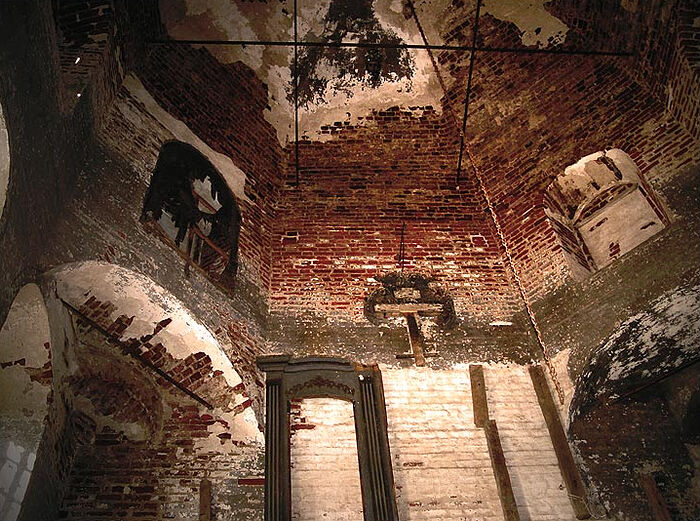With God’s help, I will continue to deliver my sermon about the road to Calvary lying ahead before the disciples and the followers of Christ during the Passion Week.
The Lord told the apostles that after two days comes the Passover. Behold, we are going up to Jerusalem, and the Son of Man will be betrayed to the chief priests and to the scribes; and they will condemn Him to death and deliver Him to the Gentiles; and they will mock Him, and scourge Him, and spit on Him, and kill Him. The last two words by the Savior express His heartfelt sorrow. Like heavy bonds, this sorrow grew more painful with every passing minute and fueled even greater suffering. Affliction after affliction attacked the Redeemer’s heart on His way to voluntary passion. Many of those afflictions await the faithful along their life’s path. They are the ones whose souls respond to the thought of the cross as in their spirit they carry their crosses, woven from sorrows and tribulations.
The deep sorrows of the Savior began even before He was delivered into the hands of sinners. The Bible says that a few days before the Passover, when everyone was getting ready to celebrate the joyful feast, when people were about to rest from the burden of daily and temporal cares and devote themselves fully to peaceful repose, the Savior received the sorrowful news of the illness of His friend Lazarus. His friend’s death brought Him to tears. He wept at his grave—tears over a lost friend shed on the eve of His sufferings on the cross. Don’t we also weep such tears? Which of you has not wept at a friend’s grave because it robbed you of the joy of this mutual friendship? It is a dreadful trial for all the powers and capabilities of a human soul. It is terrible to be abandoned. One can’t witness without compassion the tears of a widow who has lost her child or husband, or of children separated from their father, or over friends who were taken away from us by the fateful verdict of silent death that is not subject to trial or appeal. All words of consolation are mere words. We are left only with tears. Once the Savior washed the grave of friendship with His tears, He thus lightened the burden of this loss for us as well. May all orphans find relief in tears on their way of the cross, the way of the lost and the lonely. Tears will pave the way to consolation; great sorrow from being left alone and feeling helpless will be washed with the pure flow of commitment to the will of God, for not even a hair of your head will fall without it.
Further on, the Gospel speaks of Christ as the Redeemer. He was going to Jerusalem and, before entering it, looked at the city from the Mount of Olives. His disciples admired the picturesque location and lively movement of life in the festive capital, its admirable, solid buildings, and the millions of people coming and going as they arrived in Jerusalem from all directions. What brought joy to His disciples caused bitterness to the Savior. He wept about the future of the city, because the sword of punishment, destruction and dispersion was already hanging over it. The Savior foresaw that Jerusalem would be destroyed under the ruins of its wickedness. It would turn into rubble so that nothing could attest to its former glory. This torturous feeling of sadness leaves no place for consolation, and the faithful cross-bearers of all times have encountered it. In our lives, this feeling doesn’t apply to Jerusalem, a city, kingdoms, or states, but to our own families and the families of our loved ones. So often we observe the decay, desolation and dispersion of families who have abandoned the commandments of God or whose members have renounced the Father’s will. To foresee the desolate future of a rebellious son, a poorly-behaved daughter, or an ungrateful friend is a horrifying sorrow. All of us are in one way or another linked with certain familial bonds. If we observe a weakening of these bonds, our soul is unconsciously filled with terror at a single thought that this link is bound to be broken. When the thread of moral bonds among the loved ones is severed, the joy of the earthly life will perish with it. Sorrow, dispersion, and desolation will follow; the abomination of desolation standing in the holy place will follow, as spoken by the prophet.
Next, the Gospel tells us that Christ went into the temple of God in Jerusalem. He found so much disorder and trading going inside that the temple resembled on the one hand a noisy marketplace, and on the other hand, a den of thieves. The Savior was deeply affected when He beheld this outrage. Even His meek soul was angered after witnessing the desecration of the house of God.
Even if we are the Savior’s followers, we aren’t so troubled by this affliction. We have grown accustomed to wickedness. We almost feel good when these habits increase. A good many of us facilitate this process. However, such people aren’t among the cross-bearers.
How desperate is the plight of those people whose churches lose the right to be called the houses of prayer and decency. This is where society disintegrates and its spiritual viability is rotting away. Linked together are the pretentious, greedy, and lazy clergyman and the inattentive, indifferent, and corrupt layman. Their lips don’t invoke God’s grace, but their corrupt heart hastens the wrath of God. May God protect us from increasing the number of those who commit blasphemy and serve idols. Let us follow Christ to enter the temple He cleansed. Let us act with reverence there. Amen.




